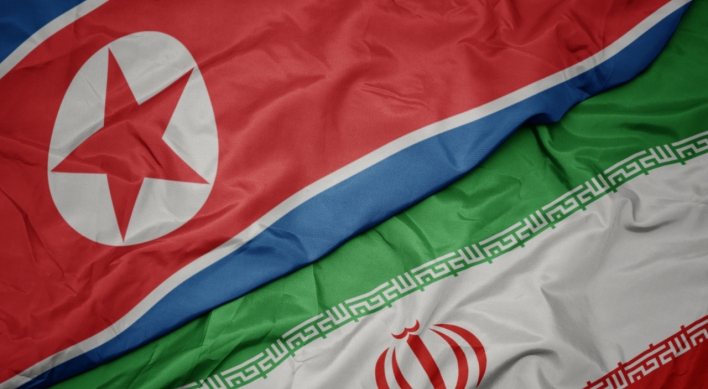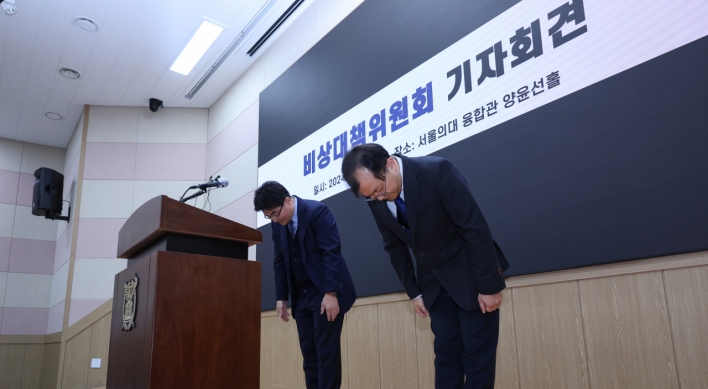[Michael Abramowitz and Sarah Repucci] Americans still want their government to support democracy abroad
By Korea HeraldPublished : July 17, 2018 - 16:58
A flood of commentaries concluding that Americans are more inward-looking, indifferent to international engagement and skeptical about the country’s obligation to influence change in repressive environments might lead us to believe Americans are cooling on democracy.
These perceived signs of neo-isolationism have been reinforced by a president who uncritically lauds leaders like Vladimir Putin and Kim Jong-un while picking fights with democratic allies like Angela Merkel and Justin Trudeau. And by commentators who dismiss America’s decadeslong status as the leader of the free world as little more than a lamentable exercise in “moral imperialism.”
But a new Democracy Project poll suggests Americans support policies that fortify other democracies; that they back the spread of free institutions; and, most important, that they recognize that a world dominated by democratic countries serves American national interests while the resurgence of dictatorships poses a clear threat to our security and economic well-being.
The research, commissioned by Freedom House, the George W. Bush Institute, and the Penn Biden Center for Diplomacy and Global Engagement, and conducted by two leading polling firms, one Democratic and one Republican, polled a representative sample of Americans and was accompanied by a series of focus groups that more closely examined the views of key demographic groups.
The findings show that bipartisan majorities of Americans want to live in a democracy. What may be particularly surprising, however, is that Americans overwhelmingly believe it is better for the United States if more countries abroad are democracies as well.
Since the Iraq War tarnished the phrase “democracy promotion,” it’s been conventional wisdom that Americans favor a retreat from global leadership and a strategy akin to President Donald Trump’s “America First” approach. While Americans remain skeptical of military interventions on behalf of humanitarian causes, the poll suggests that they are ready to support other actions on behalf of global democracy. Overall, 71 percent of the public favors “the US government taking steps to support democracy and human rights in other countries.” By 36 percent to 18 percent, more Americans would favor increasing rather than decreasing US government efforts to support democracy and human rights abroad.
Moreover, arguments in favor of US support for democracy and human rights abroad generate much more agreement than arguments against. The moral justification for such efforts proves especially compelling, with 91 percent agreeing that, “We can’t control what happens in the world, but we have a moral obligation to speak up and do what we can when people are victims of genocide, violence, and severe human rights abuses.”
Belief in the value of human rights democracy extends beyond simple idealism. An 84 percent majority agree that “when other countries become democratic, it contributes to our own well-being.” Similarly, a 67 percent-to-22 percent majority agree that American security is enhanced “when other countries are democratic” and reject the statement that “there is no impact on US security when other countries move away from dictatorship and become democracies.” Majority support for this idea crossed party lines but is slightly stronger among Republicans.
Given events of the past two decades, one has to be cautious in drawing dramatic conclusions. Democracy promotion remains near the bottom of the public’s foreign policy priorities, and Americans are particularly resistant to democracy promotion via military intervention. But Americans clearly see a link between the presence of strong democracies abroad and their own economic and security interests.
That was reflected in comments heard in the focus groups as part of this research. A millennial from St. Louis noted, “If you choose not to interfere, you leave things open to the rise of dictatorships that will one day threaten.” And 10 of 11 participants in a group of Trump voters in Pittsburgh agreed with the statement, “If we support progress toward democracy in other countries, it makes the US more prosperous.”
Such comments suggest that, despite the traumas of the past two decades, Americans still very much subscribe to what had once been seen as a foundational element of US foreign policy -- that the US should support the democratic aspirations of citizens everywhere. And with the right leadership, they are open to nonmilitary options to support these aspirations, whether it be targeted sanctions on egregious human rights violators, support for front-line activists, or simply making clear our disapproval for dictators -- once a key element in the US toolkit.
History suggests that the American people will follow strong executive leadership on the issue of democracy and human rights. That a majority still supports the promotion of democracy abroad underscores that America’s faith in the power and universality of democratic principles remains strong.
Michael J. Abramowitz and Sarah N. Repucci
Michael J. Abramowitz is president of Freedom House. Sarah Repucci is its senior director of global publications. They wrote this for the Dallas Morning News -- Ed.
(Tribune Content Agency)
These perceived signs of neo-isolationism have been reinforced by a president who uncritically lauds leaders like Vladimir Putin and Kim Jong-un while picking fights with democratic allies like Angela Merkel and Justin Trudeau. And by commentators who dismiss America’s decadeslong status as the leader of the free world as little more than a lamentable exercise in “moral imperialism.”
But a new Democracy Project poll suggests Americans support policies that fortify other democracies; that they back the spread of free institutions; and, most important, that they recognize that a world dominated by democratic countries serves American national interests while the resurgence of dictatorships poses a clear threat to our security and economic well-being.
The research, commissioned by Freedom House, the George W. Bush Institute, and the Penn Biden Center for Diplomacy and Global Engagement, and conducted by two leading polling firms, one Democratic and one Republican, polled a representative sample of Americans and was accompanied by a series of focus groups that more closely examined the views of key demographic groups.
The findings show that bipartisan majorities of Americans want to live in a democracy. What may be particularly surprising, however, is that Americans overwhelmingly believe it is better for the United States if more countries abroad are democracies as well.
Since the Iraq War tarnished the phrase “democracy promotion,” it’s been conventional wisdom that Americans favor a retreat from global leadership and a strategy akin to President Donald Trump’s “America First” approach. While Americans remain skeptical of military interventions on behalf of humanitarian causes, the poll suggests that they are ready to support other actions on behalf of global democracy. Overall, 71 percent of the public favors “the US government taking steps to support democracy and human rights in other countries.” By 36 percent to 18 percent, more Americans would favor increasing rather than decreasing US government efforts to support democracy and human rights abroad.
Moreover, arguments in favor of US support for democracy and human rights abroad generate much more agreement than arguments against. The moral justification for such efforts proves especially compelling, with 91 percent agreeing that, “We can’t control what happens in the world, but we have a moral obligation to speak up and do what we can when people are victims of genocide, violence, and severe human rights abuses.”
Belief in the value of human rights democracy extends beyond simple idealism. An 84 percent majority agree that “when other countries become democratic, it contributes to our own well-being.” Similarly, a 67 percent-to-22 percent majority agree that American security is enhanced “when other countries are democratic” and reject the statement that “there is no impact on US security when other countries move away from dictatorship and become democracies.” Majority support for this idea crossed party lines but is slightly stronger among Republicans.
Given events of the past two decades, one has to be cautious in drawing dramatic conclusions. Democracy promotion remains near the bottom of the public’s foreign policy priorities, and Americans are particularly resistant to democracy promotion via military intervention. But Americans clearly see a link between the presence of strong democracies abroad and their own economic and security interests.
That was reflected in comments heard in the focus groups as part of this research. A millennial from St. Louis noted, “If you choose not to interfere, you leave things open to the rise of dictatorships that will one day threaten.” And 10 of 11 participants in a group of Trump voters in Pittsburgh agreed with the statement, “If we support progress toward democracy in other countries, it makes the US more prosperous.”
Such comments suggest that, despite the traumas of the past two decades, Americans still very much subscribe to what had once been seen as a foundational element of US foreign policy -- that the US should support the democratic aspirations of citizens everywhere. And with the right leadership, they are open to nonmilitary options to support these aspirations, whether it be targeted sanctions on egregious human rights violators, support for front-line activists, or simply making clear our disapproval for dictators -- once a key element in the US toolkit.
History suggests that the American people will follow strong executive leadership on the issue of democracy and human rights. That a majority still supports the promotion of democracy abroad underscores that America’s faith in the power and universality of democratic principles remains strong.
Michael J. Abramowitz and Sarah N. Repucci
Michael J. Abramowitz is president of Freedom House. Sarah Repucci is its senior director of global publications. They wrote this for the Dallas Morning News -- Ed.
(Tribune Content Agency)
-
Articles by Korea Herald


![[Exclusive] Korean military set to ban iPhones over 'security' concerns](http://res.heraldm.com/phpwas/restmb_idxmake.php?idx=644&simg=/content/image/2024/04/23/20240423050599_0.jpg&u=20240423183955)
![[AtoZ into Korean mind] Humor in Korea: Navigating the line between what's funny and not](http://res.heraldm.com/phpwas/restmb_idxmake.php?idx=644&simg=/content/image/2024/04/22/20240422050642_0.jpg&u=)

![[Graphic News] 77% of young Koreans still financially dependent](http://res.heraldm.com/phpwas/restmb_idxmake.php?idx=644&simg=/content/image/2024/04/22/20240422050762_0.gif&u=)




![[Pressure points] Leggings in public: Fashion statement or social faux pas?](http://res.heraldm.com/phpwas/restmb_idxmake.php?idx=644&simg=/content/image/2024/04/23/20240423050669_0.jpg&u=)








